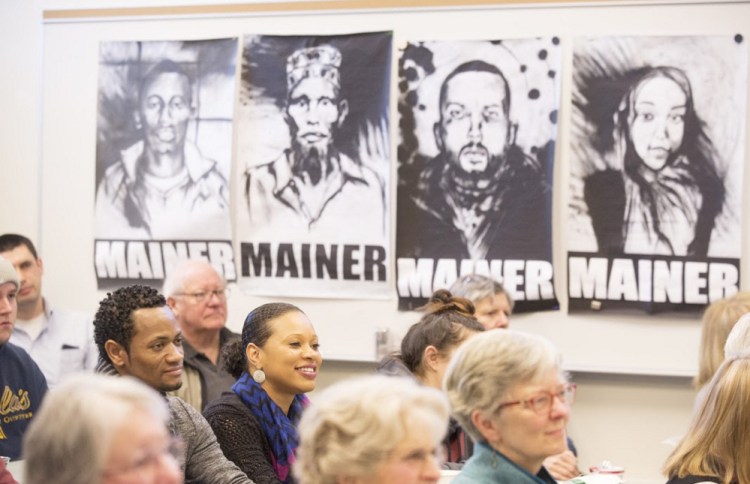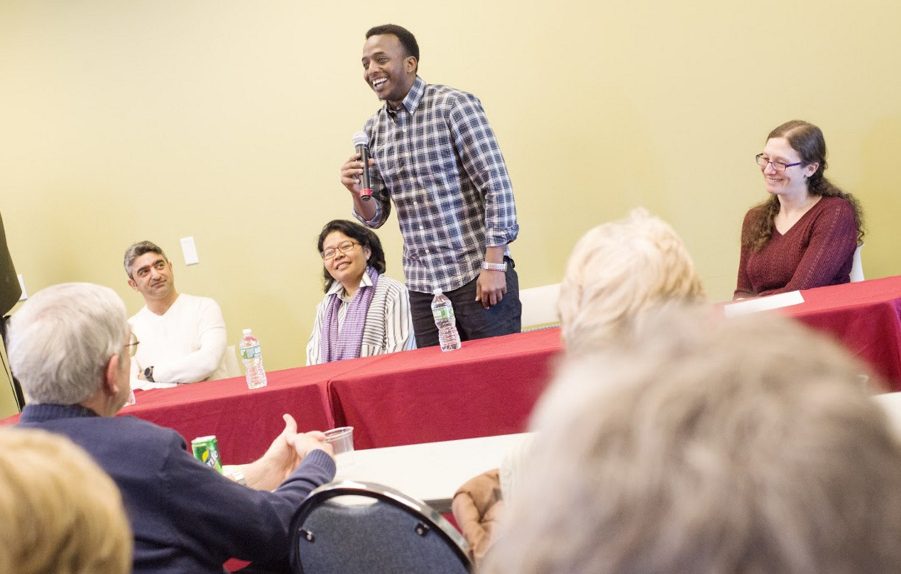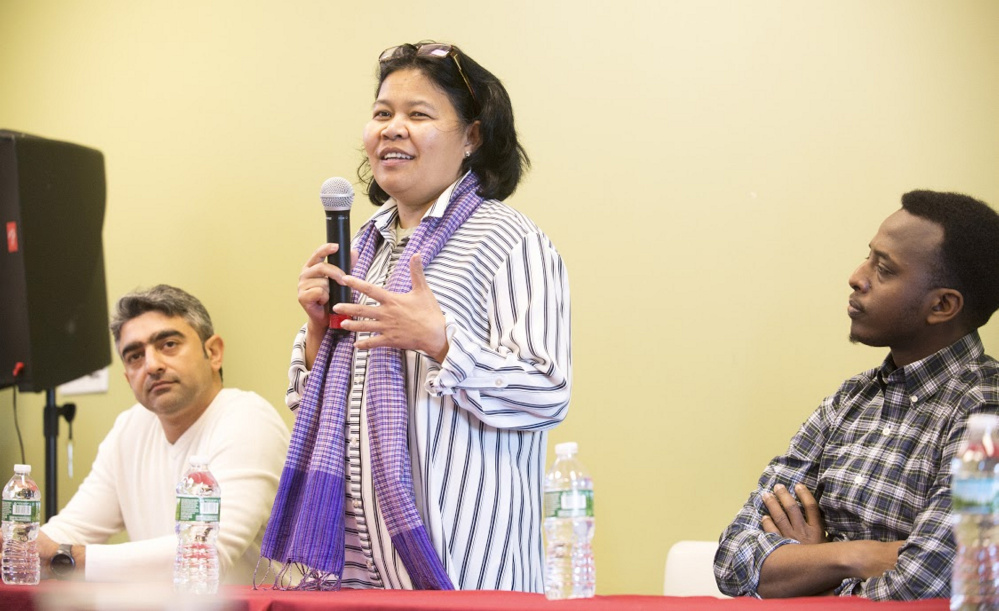AUGUSTA — When Abdi Iftin was growing up in Somalia, he’d dream of coming to America for a better life. He’s lived in Maine for more than two years, but he said his dreams are different now that Donald Trump is president.
Iftin and two other refugees shared their stories during a panel at the Holocaust and Human Rights Center of Maine at the University of Maine at Augusta Monday afternoon.
“I don’t think this is the American dream I expected,” Iftin said referring to being a Muslim from Somalia living in the U.S. under the current presidential administration.
The forum began just as Trump’s newly signed executive order was announced. The new order bans immigration from six Muslim-majority countries — Somalia, Libya, Iran, Sudan, Yemen and Syria — and reinstates a temporary ban on all refugees.
Iftid said he has no idea why Trump keeps including his homeland in the travel ban, because he doesn’t know of any terrorist attack in America carried out by a Somali.
“I don’t think Somalis are a problem to this country,” Iftin told a packed audience. “We just come here to find peace and a better life.”
He said he’s the only one from his family in the U.S., because his parents, brother and sister haven’t come here yet. His brother, in Kenya, has been going through the refugee process for almost two years, but he’s given up trying to come to America and is now trying to get into Canada or Australia.
“This is a huge headache for me,” he said. “I was hoping we could all reunite and start a new life and start dreaming about the American dream.”
Iftin, 31, of Portland, was joined on the panel by Iraqi refugee Nawar Al Obaidi and Cambodian refugee Makara Meng. Iraq wasn’t included in Trump’s newest travel ban.
Al Obaidi, 38, lives in Westbrook and has a bachelor’s degree in engineering he earned in Iraq and a master’s in project management from a school in New Hampshire. He said he started from scratch when he came to the U.S. in 2012 with his wife and three children.
“When I was in Iraq, I was a supervisor at a Caterpillar dealership, but when I came here, I started as a laborer working part-time doing windows,” Al Obaidi said. He said there are a lot of misconceptions about Iraq and its people.
“For one thing, we do have cars and technology,” he said. “A lot of people think that Iraqis are bad, but they’ve never met me or know who I am.”
Meng escaped the genocide in Cambodia in the early 1980s and came to Maine in 1984 during a blizzard. She had the audience laughing when she talked about getting off the plane in Boston wearing a sarong and flip flops because the only videos and pictures she saw about America were taken during the summer.
“I thought I was smart because I wanted to sell the snow,” she said. “I told the idea to my sponsor who said I should probably come up with a new business plan.”
The three panelists said erasing misconceptions about their native lands is often challenging. Meng, 46, of South Portland, said people think that in Cambodia, they eat dogs and rats. Al Obaidi said people in Iraq don’t travel by camel, and Iftin said not everyone from Somalia is either a pirate or a terrorist.
Changing misconceptions can be difficult, especially when speaking to a room full of people who don’t believe in falsehoods or stereotypes just because someone comes from a certain country. Pamela White, a former U.S. Ambassador to Haiti and The Gambia, said making your voice heard is important.
“I belong to a little group in Harpswell, so maybe we can start showing up certain places and making sure our voices are heard,” White said. “I don’t know what the answer is because (the anti-immigration stance) defies logic and strikes me as so anti-American.”
White, who’s from Lewiston, was appointed ambassador to The Gambia by President Barack Obama in November 2010 and became the ambassador to Haiti in August 2012. She said her career as a diplomat allowed her to use her voice and the mechanism of the U.S. government to share American values.
“For my entire career, even under Republicans, we were very pro-immigration,” White said. “We were begging people to come to the United States.”
All three refugees said they don’t want to force anyone to believe one thing or the other, because they support everyone’s right to have an opinion. They just want to tell their stories of survival and of their immigration to the United States and let everyone judge for themselves.
Iftin said as an African, Muslim immigrant from Somalia, he doesn’t go to bed with the same feeling since Trump’s election in November.
“I have a green card, and so far, we’re fine,” he said. “But it’s Trump, so he can wake up tomorrow and say that people with a green card (need to) get out, and that’s what scares me.”
But he is trying to keep a positive attitude in trying times. Iftin remembers learning English in Somalia by watching Arnold Schwarzenegger movies and said he felt betrayed when he arrived in Maine in August 2014 because it didn’t look like the America he had seen on TV, in movies and in pictures.
“To me, America was like another planet, and I was so excited,” he said. “Then during the winter of 2015, I was like a happy dog playing in the snow, so I put pictures on Facebook and people back home said I must be in heaven. A few days and a lot of snow later, I joked that it was hell.”
The Holocaust and Human Rights Center of Maine partnered with the Mid-Maine Global Forum to present the panel, called “This is ME, Too: From Everywhere to New Mainer.” Its next program, “Yearning to Breathe Free: The Immigrant Experience in Maine,” will be 12 p.m. April 14 at the Waterville Public Library.
Executive Director Elizabeth Helitzer said Monday’s program was timely because of Trump’s latest executive order and travel ban.
“We hear so many things about non-American countries that aren’t necessarily true,” she said. “We are really trying to combat the dangers of living in an ‘us versus the other’ world.”
Jason Pafundi — 621-5663
Twitter: @jasonpafundiKJ
Copy the Story Link
Send questions/comments to the editors.






Success. Please wait for the page to reload. If the page does not reload within 5 seconds, please refresh the page.
Enter your email and password to access comments.
Hi, to comment on stories you must . This profile is in addition to your subscription and website login.
Already have a commenting profile? .
Invalid username/password.
Please check your email to confirm and complete your registration.
Only subscribers are eligible to post comments. Please subscribe or login first for digital access. Here’s why.
Use the form below to reset your password. When you've submitted your account email, we will send an email with a reset code.